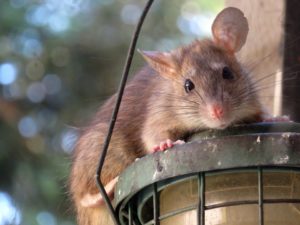 The fact about all rodents is that they have incisors that never stop growing. They gnaw continuously to keep their choppers in check. Otherwise, their teeth would grow to such an impractical length that they would starve and die.
The fact about all rodents is that they have incisors that never stop growing. They gnaw continuously to keep their choppers in check. Otherwise, their teeth would grow to such an impractical length that they would starve and die.
Rodents can cause considerable damage in many places, and that includes damage to electrical wires and cables. Rodents use their sharp incisors to gnaw food, they sometimes chew on things like wood or ducts, but they also chew on electric cables and wires. Places like station offices which are full of rush there the rodents make their houses due to easy availability of food which is thrown by the people so this causes the growth of these rodents to make their way easy to access food.
There are many people who find electrical wires in their house, office, cars, ships, etc with bruises and scratch marks.
As a car owner, we are probably aware of the risks such as accidents and other threats. Have we ever thought of the threat and the risk that rats can pose in our vehicle though they don’t just damage your home when an infestation happens, they can cause serious damage to your vehicle too? The biggest threat to our vehicle concerning rats is the wiring. Thus sometimes it can be expensive and complicated to repair the wiring that can be damaged by a rat infestation.
Rats also cause problems by biting the electrical wiring in cars, trucks, and trailers. The damage can sometimes be very difficult to locate, resulting in large repair bills!
Insulation is not safe from rodents. They will tunnel into insulation inside walls and attics, either to make a home or to gather soft materials for their nests.
Rodents build their nests in large electrical appliances, and chewing on or through insulation and wiring, which can cause the appliance to short circuit, or lead to the risk of fire.
According to the news article,
When a rat makes a home in your engine compartment during a pandemic
Phillip Jang / Times Colonist
May 25, 2020
This is the evidence. Chewed cables. Bits of debris. Droppings. A rat has been spending time in your engine compartment.
Rats can cause tremendous damage, chewing through wiring, gnawing on hoses, plugging things up with debris.
The chances of trouble can increase if a car isn’t driven much, like during a pandemic when people are staying home.
Investigation: Lawsuits claim rodents chewing through car wires
By Wendy Saltzman | Wednesday, June 21, 2017
A furry little culprit is causing big problems for car manufacturers and, possibly more importantly, for drivers whose vehicles are being destroyed.
Now lawsuits are popping up across the country claiming rodents are responsible, eating cars from the inside out. And it’s likely not covered under your warranty.
Critics say soy-wire coverings now used in many new cars are also a tasty food source attracting rodents. They’re chewing through wires and costing car owners thousands of dollars
We at C Tech Corporation are in a unique position to provide solutions to the problems caused by these creatures. Instead of killing our products repels the rodents. Our products results have been positive with our customers
At C Tech Corporation we make use of Mother Nature’s gift of senses to these rodents in developing a non- toxic & non-hazardous formula.
Rodrepel™ is a low-toxic, non-hazardous rodent aversive repellent.
Rodrepel™ is a perfect blend of smart technology and green chemistry.
The product triggers a fear response in rodents thus protecting the application. It causes severe temporary distress to the mucous membrane of the rodents due to which the pest stays away from the application. The product triggers an unpleasant reaction in case if the pest tries to gnaw away the application. After encountering the above-mentioned emotions, the animal instinctively perceives it with something it should stay away from and stores this information for future reference. The fact that certain rodents are repelled is mimicked by other rodents as well. Thus, the other rodents too stay away from the applications. The unpleasant experience is imprinted within the animal’s memory and passed on to its progeny.
Our eco-friendly products do not kill the target species but only repel them triggering a fight and flight response within them.
The products are available in the form of a masterbatch which can be incorporated in pipes, films, cables, etc. while manufacturing. This would result in the final cable or wire being rodent repellent. This would be an efficient way of deterring the rodents from chewing the cables and wires and thus negate the possibility of a short circuit.
While the Rodrepel™ liquid concentrate, when diluted in paints, can be used to paint the interior and exterior of the restaurants. It can be applied in the kitchen and food storage areas in restaurants.
Rodrepel™ lacquer can be coated topically over the applications which need protection. It can be applied to a variety of surfaces like wood, concrete, metal, polymer, ceramic etc.
Our newly developed product in the form of a spray can be applied to the already installed cables and wires.
Our products provide a safe and environmentally friendly solution to avoid rodent infestation.
By using our products, you can get an effective and long-lasting solution against pest nuisance.
You could thus contribute to us in using products that are eco-friendly thus causing no damage to the environment.
Contact us at technical.marketing@ctechcorporation.com if you’re facing problems with rodents and get the best remedies to combat the pest menace.
Also, visit our websites:
http://www.ctechcorporation.com/
http://www.rodrepel.com/
http://www.termirepel.com/
http://www.combirepel.com/
Follow our Facebook pages at:
1] https://www.facebook.com/Combirepel-411710912249274/
2] https://www.facebook.com/Termirepel-104225413091251/
3] https://www.facebook.com/Rodrepel-120734974768048/
Follow us on our Twitter pages at:
1] https://twitter.com/rodrepel
2] https://twitter.com/termirepel
3] https://twitter.com/combirepel
